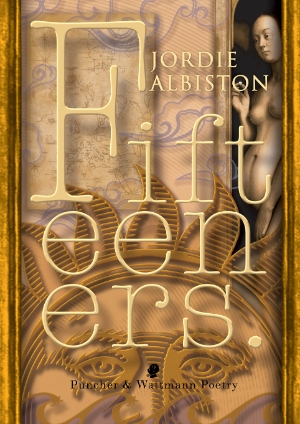Poetry
Jennifer Harrison reviews 'In the Room with the She Wolf' by Jelena Dinić and 'Beneath the Tree Line' by Jane Gibian
In an impressive first collection, the South Australian poet Jelena Dinić incorporates her Serbian heritage and memories of war-affected Yugoslavia into an Australian migration narrative of clear-sighted beauty. William Carlos Williams wrote in the introduction to Kora In Hell: Improvisations (1920): ‘Thus a poem is tough … solely from that attenuated power which draws perhaps many broken things into a dance giving them thus a full being.’ Although far from improvisational, Dinić’s poetry compositionally integrates both fragility and strength as it draws together diverse experiences of war trauma, cultural displacement, the petty administrative routines of immigration departments, a Malaysian writing fellowship, Australian icons (such as the rainwater tank), folklore, and bathing in the Adriatic Sea.
... (read more)Nadia Rhook reviews ‘Borderless: A transnational anthology of feminist poetry’ edited by Saba Vasefi, Melinda Smith, and Yvette Holt
‘Borderless’ is ‘a transnational anthology of feminist poetry’, arranged alphabetically with no themed sections, that I read slowly, out of paginated order, and savoured. Is ‘Borderless’ a description or an ideal? I wondered, as I returned, between poems, to look at the cover image of a multi-coloured painted woman, a body located in no place I could discern. Does ‘Borderless’ refer to a poet’s ability to dissolve borders through imagination, or to a temporary state of flight or transgression? Perhaps, a borderless world is one akin to a poetry anthology with no hierarchy or divisions to order the poems and their meanings.
... (read more)John Hawke reviews 'Poetry and Bondage: A history and theory of lyric constraint' by Andrea Brady
Andrea Brady’s monumental study of poetry and constraint focuses on ‘the ways that poets invoke bondage as metaphor while effacing the actuality of bondage’. Milton’s aspiration to deliver poetry from ‘the modern bondage of rhyming’, and Blake’s injunction that ‘poetry fetter’d, fetters the human race’, associate formal freedoms with political liberation. The modernist discovery of free verse was quickly followed by a formalist reaction in the 1940s, which was in turn displaced by renewed experimentation over the following decades.
... (read more)Paul Hetherington reviews 'Collected Prose Poems' by Gary Catalano
The poetry community in Australia, as in the United Kingdom, has been slow to accept prose poetry as a legitimate poetic form. Yet there have been celebrated exponents of prose poetry over nearly two centuries – and even longer if the prose component of the Japanese Haibun, developed by Matsuo Bashō (1644–94), is understood as prose poetry.
... (read more)Charles Bernstein, born in 1950, is a prolific poet and theorist of Language poetry, which arose in the 1970s in the wake of the anti-Vietnam War movement (or the American War, as the Vietnamese call it). As with similar movements in many countries, including Australia, this now semi-institutionalised poetry began as radical revolt against an established verse culture that preferred its poetry to be an easily palatable, Inauguration-worthy commodity. Instead, Bernstein and his colleagues variously practised a ‘multi-discourse text’ that chipped away at the boundary between poetry and critical theory. ‘Poetry is the aversion of conformity,’ Bernstein writes in an early essay, rephrasing Ralph Waldo Emerson. It is a site of perpetual enquiry rather than the expedient repose of fixed meaning.
... (read more)Every poet has his or her addictions: words they use over and over again, ones they own ‘by right of obsessive musical deed’ (to quote Richard Hugo). For Emily Dickinson, it was thee, thou, and Death. For Sylvia Plath, it was him, nothing, go, and gone. For Gabriel García Lorca, it was sangre, lagrimas, negro, and corazón. For Jordie Albiston, it just might be world, the word that aims to contain everything.
... (read more)Life Before Man (LBM), the poetry imprint of Gazebo Books, was founded by artist and publisher Phil Day in 2020. To date, seven books have been published, including works by Subhash Jaireth, Cassandra Atherton, Anthony Lawrence, Gary Catalano, and Alex Selenitsch. Forthcoming is a substantial international anthology of prose poetry, titled Alcatraz.
... (read more)Damen O’Brien’s first collection is an exceptional accomplishment. His individual poems have won several competitions (including the 2017 Peter Porter Poetry Prize). O’Brien signals the emphases of Animals with Human Voices in his Afterword, stating that the world has become a ‘meaner’ place during the ten years of its completion: ‘a place of harsh politics, that values outrage over kindness, tribalism over empathy’. He concludes: ‘Like the animals of the title, the poems are voices for human problems and troubles, for the little moments and cares of the human condition.’
... (read more)‘The flag’s taking off for that filthy place, and our jargon’s drowning out the drums.’ A. Frances Johnson’s new collection begins with this quote from Rimbaud, which immediately betrays her appreciation for both the European avant-garde and the viral nature of the context from which it emerged. Johnson is a poet, painter, novelist, and academic acutely sensitive to such colonial haunts, perhaps largely due to the delight she takes in the other tones offered up by historical subject matter. She has displayed this previously in Eugene’s Falls (2007), an expansive novel about Eugene von Guérard, and in exhibitions dealing with the ambiguous textures of botanical empire building. Interestingly, though, her layers of historical literacy have led to a skilful inspection of her own aesthetic fetishes, writing as she does in a time when ever more bilge-water seems to be issuing from the half-drowned ship of Western culture.
... (read more)It is disconcerting how the author of seven poetry collections can ambush the normally attentive reader of Australian poetry with such a forceful body of work as David Musgrave’s Selected Poems, which runs to more than two hundred pages. Musgrave’s individual collections have appeared with various publishers over the years since To Thalia back in 2004, but insufficient attention has been paid to them.
... (read more)








